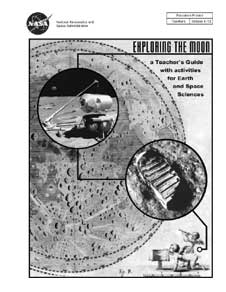Lunar Education
Contents
Introduction
This page includes two sections - the first is aimed at high school and college students wanting to learn about colleges and universities that offer classes and research opportunities relating to the Moon.
The second is for K-12 teachers and other educators who need age appropriate materials for teaching about the Moon. The goal is not to be exhaustive, but to point to the best.
Lunar U
During the first great period of Lunar Exploration - in the 1960s and early 70s - there were few academic programs to prepare students to become lunar scientists or engineers. These fields were invented by the participants who had mostly been trained in engineering, physics and geology.
Now, with spacecraft from three countries orbiting the Moon, and a number of national and commercial entities planning further lunar exploration, including sending humans to the Moon, there is a renewed interest and need for relevant academic preparation. Fortunately, there are now a number of schools in the US and elsewhere to recommend to students. Below is an informal list of such schools, initiated by Chuck Meyers of NASA Johnson Space Center, to provide prospective students a place to begin to learn about education options. Chuck and I have suggested a list of schools that we know to offer lunar (and often planetary) course work as well as faculties involved in lunar research and mission planning. We invite additions to this list by students, faculty and staff from these institutions to better describe their offerings. It is easy to edit and add material, please click the "edit this page" tab above (and after registering for the Moon-Wiki) add new schools and better descriptions.
And we encourage students to use the 'Discussion" tab above to ask any questions about preparing for a career related to the Moon.
Here are some general recommendations about lunar education. As an undergraduate student there are few colleges that offer a specialization in lunar science or lunar engineering. And that is good. The undergraduate years are the time to gain a well rounded education in the liberal arts as well as a strong foundation in physics, geology, engineering or a related field. By attending a school which has strong graduate programs about the Moon, undergraduate students often have opportunities to take some courses about the Moon and planets and to assist in research projects. This is a great way to experience what a lunar career might involve and to be inspired by actually contributing to understanding and returning to the Moon. There are also a few summer internships for undergraduates at NASA centers that put you in contact with leading researchers. Among the most famous is a summer program hosted over the last 30 years by the Lunar and Planetary Institute in Houston.
Thanks!
- tychocrater Dec 24, 2008
Where to Study the Moon
The schools listed below typically have strong academic and research programs that will help prepare you to become professionally involved in returning to the Moon. To become a lunar scientist it is usually necessary to earn a PhD degree, but there is also great need for well trained technicians with BS and MS degrees. Electrical, mechanical and aerospace engineers with BS degrees are hired by NASA and aerospace contractors to work directly on building spacecraft, lunar habitats and tools to use on the Moon. Starting salaries in science and engineering are typically $40,000 to $60,000.yr, and experienced scientists and engineers earn $80,000 and up.
Eastern USA
Brown University, Providence, RI
Carnegie Mellon University, Pittsburgh, PA
Massachussets Institutue of Technology, Cambridge, MA
University of Tennessee, Knoxville, TN
Central USA
Notre Dame University, Notre Dame, IN
University of North Dakota, Grand Forks, ND
Washington University, St Louis, MO
Western USA
Arizona State University, Tempe, AZ
California Institute of Technology, Pasadena, CA
University of Arizona, Tucson, AZ
University of California, Los Angeles, CA
University of Colorado, Boulder, CO
University of Hawaii, Honolulu, HI
University of New Mexico, Albuquerque, NM
Europe
Birkbeck College, London, England
Münster University, Münster, Germany
University College Cork (Geology Dept.), Cork, Ireland
The Open University, (OU), UK - astrokat
International Space University , (ISU), Strasbourg, Alsace, France.- astrokat
University of Leicester, Leicester, UK.- astrokat
Asia
K-12 Activities
First year college students interested in the Moon or planets probably had positive and engaging experiences in their previous 12 years of education. NASA and other groups have created many supplemental activities used by educators to inspire and educate kids; some work quite well. This section of Lunar Education provides recommendations of lunar educational activities. Please add to the list, especially with comments on how good the products actually are!
Thanks!
- tychocrater Dec 25, 2008
 Exploring the Moon - this is the classic 1997 guide developed by lunar scientist Jeff Taylor at the University of Hawaii. The activities are scientifically accurate and meaningful, unlike many educational products.
Exploring the Moon - this is the classic 1997 guide developed by lunar scientist Jeff Taylor at the University of Hawaii. The activities are scientifically accurate and meaningful, unlike many educational products.
- Use the Bradford Robotic Telescope to take a picture of the moon. Register to use the site and 'see what you can see'.
There is a certain amount of educational material available on the site.
See the articles for an Idea of what can be done.- astrokat Jul 27, 2010